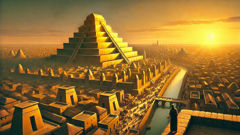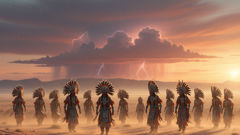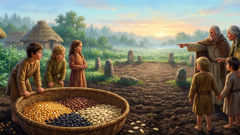Introduction
In the land where the two great rivers, the Tigris and Euphrates, cradled the earliest blooms of civilization, tales were told long before the world knew the name of Sumer. Across the endless plains and bustling cities of mud-brick and sun-baked clay, myths traveled like the wind: born in the minds of priests and kings, whispered among farmers at dusk, sung by temple maidens to the listening gods. Among these stories, one legend stood tall, casting a shadow over all that came after—the legend of Enmerkar and the Lord of Aratta. This was a time when gods and mortals moved close together, and the fate of cities was determined not only by the sword, but by wit, wisdom, and the favor of the divine. Enmerkar, the proud king of Uruk, sought to expand his city's glory and fill its temples with treasures. Yet across the burning deserts and jagged mountains lay Aratta, a city so remote and mysterious its riches seemed almost mythic—a place where lapis lazuli sparkled like pieces of the sky and gold was worked into shapes pleasing to Inanna, goddess of love and war. Enmerkar’s ambition was as vast as the rivers, but he knew he could not claim Aratta’s wealth by force alone. There were obstacles that spears and chariots could not overcome: the pride of another king, the intricate weave of tradition, the ever-watchful eyes of the gods, and the sheer tyranny of distance. The journey between Uruk and Aratta was long and perilous, a journey that would test not just armies but messengers, poets, and the very limits of human ingenuity. It was on this journey that something miraculous would be born—something that would change the world forever: the written word. In the unfolding of this epic rivalry, the Sumerians would discover the power of communication, of symbols pressed into clay, and with it, the ability to preserve memory itself. This is the story of two kings and their cities, a contest of pride and wisdom, and the invention that would outlast empires.
Enmerkar’s Ambition and the Distant City of Aratta
Uruk in its splendor hummed with life: artisans pounding copper, scribes tallying grain, and priests leading the people in song. Yet, for all its abundance, there was a hunger at its heart—the hunger of Enmerkar, king and servant of Inanna. He gazed out from his high palace, eyes drawn not to the bounty within but to the far horizon, where rumor placed Aratta, the city of legends. Aratta, shrouded in myth and mountain mists, was said to be a city beloved by Inanna herself, adorned with precious stones and gold finer than any in Uruk. Its artisans were masters, its priests wise in the ways of gods, its people proud and unyielding. To possess Aratta’s treasures was to rival the gods in splendor. But the road was cruel: deserts that sucked away strength, mountains that split the earth like a god’s wrath, and tribes who would rob the unwary. Even so, Enmerkar’s ambition could not be quenched. He summoned his counselors to the palace and unfurled his vision.
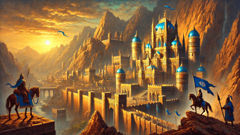
“My city must outshine all others,” Enmerkar declared. “Inanna’s temple shall be built anew, more glorious than any before. To do this, we require the gold and lapis of Aratta. We shall not send armies, but a messenger—one whose tongue is sharper than any spear.”
Enmerkar chose his best herald, a man renowned for eloquence and endurance. Laden with gifts for Aratta’s lord and a message etched in memory, the herald set off. The journey was grueling: sun-baked plains gave way to bone-chilling nights, sandstorms erased the path by day, and hunger gnawed at resolve. Yet the herald pressed on, driven by the king’s will and a sense that destiny itself had set him on this road.
After many days, Aratta rose from the haze—its ziggurat gleaming blue in the dawn, walls festooned with banners. The people of Aratta, wary but curious, ushered the herald through wide gates to the palace of their enigmatic lord. The lord of Aratta sat beneath a canopy of gold and lapis, eyes sharp as obsidian, his expression unreadable. When the herald spoke Enmerkar’s request—to send tribute, to bow before Uruk, to yield Aratta’s treasures for Inanna’s temple—silence fell.
The lord of Aratta was no less proud than Enmerkar. “Why should my city bow to yours? Are we not favored by Inanna as well? Our lands are harsh, our people strong. If Uruk wishes our gifts, let your king prove his worth before men and gods.”
The two cities, distant in miles but close now in rivalry, would trade not only words but challenges. Each would test the other’s resolve, wisdom, and connection to the divine. And so began a contest where every messenger’s breath became as precious as gold, and every word carried the weight of nations.
Trials of Words and Wonders: The Rivalry Deepens
So began the great contest—one not of armies clashing, but of minds and messengers. The journey between Uruk and Aratta soon became a path not just for trade but for challenge and cunning. The herald, having relayed Enmerkar’s message, now carried back the lord of Aratta’s reply: a riddle wrapped in defiance, demanding signs of Uruk’s divine favor and power.
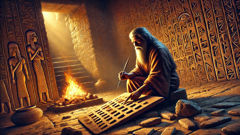
Enmerkar was undaunted. He invoked Inanna in nightly rituals, offering prayers and lavish feasts to win her blessing. He sent messages to Aratta boasting of Uruk’s might and the grandeur that would be achieved if Aratta submitted. Yet with each exchange, Aratta responded with clever riddles and impossible demands—proofs of favor from gods, wonders to be performed, and signs only a chosen one could provide.
The messengers themselves became exhausted. They had to memorize long and intricate speeches, for there was no simple means to send messages across such a treacherous land. Their minds were battered by the strain, their tongues heavy with the words of kings. With each journey, their burdens grew, and Enmerkar saw that the limits of memory and voice threatened to unravel his plans.
It was then that Enmerkar, inspired by Inanna’s whispers or perhaps by desperation, conceived a solution that would outlast his own ambitions. He took a wet slab of river clay and pressed into it marks—symbols for words, tokens for things. A scribe was summoned to shape these marks with a reed stylus: the world’s first written message. For the first time, a king’s will could cross deserts uncorrupted by memory’s failings or time’s erosion.
The herald, holding this clay tablet, felt the weight of history—though he could not have known it. He journeyed once more to Aratta, clutching the message as though it contained the fate of empires. When he presented it to the lord of Aratta, confusion flickered across the ruler’s face. The priests gathered, puzzling over the strange marks, until one, wise beyond measure, deciphered their meaning. In that moment, power shifted: words now traveled not just on the wind, but in clay. Authority, once fleeting, could now endure.
But the rivalry was not over. Aratta responded with its own wonders—magicians who conjured illusions, riddles that bent the mind, and gifts meant to test Enmerkar’s ingenuity. Inanna herself seemed to hover between the two cities, her favor uncertain, her will mysterious. Each challenge brought new displays of wisdom and invention. Uruk’s scribes refined their marks, shaping the future of writing; Aratta’s artisans answered with crafts so exquisite even the gods took notice.
The struggle stretched on: tributes demanded and refused, divine omens read in the flight of birds and the glimmer of stars, and messengers who became legends in their own right. Yet beneath all this rivalry pulsed a deeper truth: with every test and reply, both cities grew—Uruk in wisdom and invention, Aratta in pride and artistry. The world itself seemed to hold its breath, waiting to see which city would win the favor of gods and the prize of history.
Gifts, Challenges, and the Favor of Inanna
As the contest wore on, the rivalry between Uruk and Aratta became more than a test of pride—it was a crucible for invention, endurance, and belief. Both cities poured their ingenuity into the struggle. Enmerkar’s invention of writing spread quickly among his scribes, who refined the clay tablets into vessels of poetry and power. In Aratta, the artisans responded with even more dazzling gifts: intricate jewelry for Inanna, golden statues, and textiles woven with patterns that shimmered like stars.
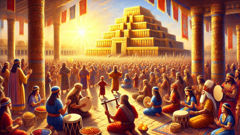
The messengers continued their perilous journeys, now carrying not just spoken riddles but written challenges—tablets bearing words that would outlast their voices. Each message grew in complexity. Enmerkar demanded tribute; Aratta replied with puzzles and magical feats. At one point, Aratta’s priests conjured a great illusion: a mountain blooming with flowers in the dead of winter, visible from the palace walls of Uruk. Enmerkar marveled at the sight but answered with his own miracle: a feast summoned from barren fields through faith and clever irrigation. The people of Uruk feasted, their trust in their king deepened.
But even miracles could not decide the contest. Enmerkar and the lord of Aratta both sought the ultimate prize: Inanna’s favor. They filled her temples with offerings, composed hymns in her honor, and staged processions that dazzled the watching crowds. The goddess, ever enigmatic, granted signs to both but withheld her final blessing. She appeared in dreams, whispered guidance in riddles, and sometimes turned her face away, leaving both kings uncertain.
Amid this uncertainty, ordinary people in both cities adapted to the new reality. Scribes became vital, their skill in cuneiform making them pillars of society. Priests learned to read omens in the tablets as well as in the sky. Merchants used writing to track goods, giving rise to new forms of trade. Children learned their letters by the temple steps. With each passing season, the innovation born of rivalry became woven into the fabric of daily life.
The contest pushed both kings to the limits of their wisdom and patience. At last, Enmerkar proposed a final challenge: let Aratta send its greatest sage to Uruk for a contest of riddles before the high priests and all the people. The lord of Aratta agreed, confident in his champion’s skill. On the appointed day, crowds filled Uruk’s great square. Scribes sat ready to record every word. The sage of Aratta faced Enmerkar’s wisest men in a contest of wit and wordplay. Riddles flew like arrows; answers came swift and sharp. After hours of contest, Enmerkar’s sage posed a question so subtle that none could answer—not even Inanna’s own priests. The crowd erupted in awe, for wisdom had triumphed where wealth and might had not.
Moved by this display, Inanna at last revealed her will: she would favor both cities for their ingenuity and perseverance. Uruk would receive tribute from Aratta, but only as a gift among equals—not as spoils of conquest. Aratta would remain proud but would honor Uruk’s invention by adopting writing and forging new ties. The rivalry ended not with defeat or surrender, but with respect and shared greatness. The world had changed—kings were wiser, cities were closer, and humanity had gained a gift more lasting than gold.
Conclusion
So the rivalry between Enmerkar of Uruk and the Lord of Aratta became legend—not just for its contests of power and pride, but for the legacy it bestowed upon the world. The invention of writing transformed more than royal communications; it allowed memory itself to endure. Laws, stories, prayers, and dreams were pressed into clay for generations yet unborn to read. Messengers no longer staggered under the burden of memory alone; their words could survive deserts, time, and even death. The cities flourished side by side—Uruk known for its wisdom and writing, Aratta for its artistry and resilience. Through their struggle, the Sumerians taught us that true greatness comes not from conquest alone but from creativity and wisdom shared. Inanna watched over both cities, her laughter echoing in the hearts of those who dared to dream and invent. And in the land between rivers, as the sun set over ziggurats and fields of grain, the story of Enmerkar and Aratta was written—and read—for centuries to come.

